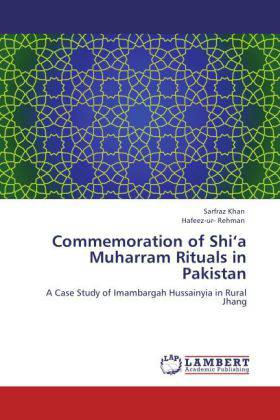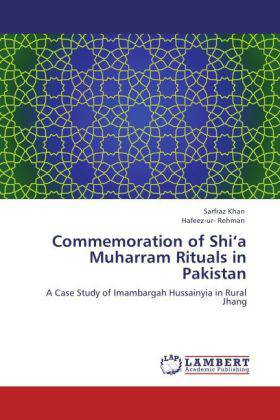
- Afhalen na 1 uur in een winkel met voorraad
- Gratis thuislevering in België vanaf € 30
- Ruim aanbod met 7 miljoen producten
- Afhalen na 1 uur in een winkel met voorraad
- Gratis thuislevering in België vanaf € 30
- Ruim aanbod met 7 miljoen producten
Zoeken
Commemoration of Shi'a Muharram Rituals in Pakistan
A Case Study of Imambargah Hussainyia in Rural Jhang
Sarfraz Khan, Hafeez-Ur- Rehman
Paperback | Engels
€ 48,45
+ 96 punten
Omschrijving
This book is based on the ethnographic study conducted in Imambargah Hussainyia in Rural Jhang, Pakistan. The main aim of this research was to investigate the ways of Muharram rituals performance among the Shi'a devotees in the locale. Researchers have used mix methods to investigate the intensity and magnitude of the rituals performance. The inhabitants perform following rituals during the month of Muharram; matam, majales, taziya, processions, alam, zuljinah, langar, and visitation of the holy shrines. According to Shi'a Muslims, these rituals were started soon after the incident of the Karbala in 61 year of Islamic Calendar. With the passage of time, these rituals matured and altered by the devotees of differences races and regions. In the present study area, people practice these rituals as a part of their daily activities and they love to practice the teachings of their Imams. For the community members, Muharram is a month of symbolic association of the Shi'as towards their Imams. Practices they perform are venerating them to the cohesion and letting them to develop a strong association at communal level.
Specificaties
Betrokkenen
- Auteur(s):
- Uitgeverij:
Inhoud
- Aantal bladzijden:
- 56
- Taal:
- Engels
Eigenschappen
- Productcode (EAN):
- 9783847349310
- Verschijningsdatum:
- 18/01/2012
- Uitvoering:
- Paperback
- Formaat:
- Trade paperback (VS)
- Afmetingen:
- 152 mm x 229 mm
- Gewicht:
- 95 g

Alleen bij Standaard Boekhandel
+ 96 punten op je klantenkaart van Standaard Boekhandel
Beoordelingen
We publiceren alleen reviews die voldoen aan de voorwaarden voor reviews. Bekijk onze voorwaarden voor reviews.











